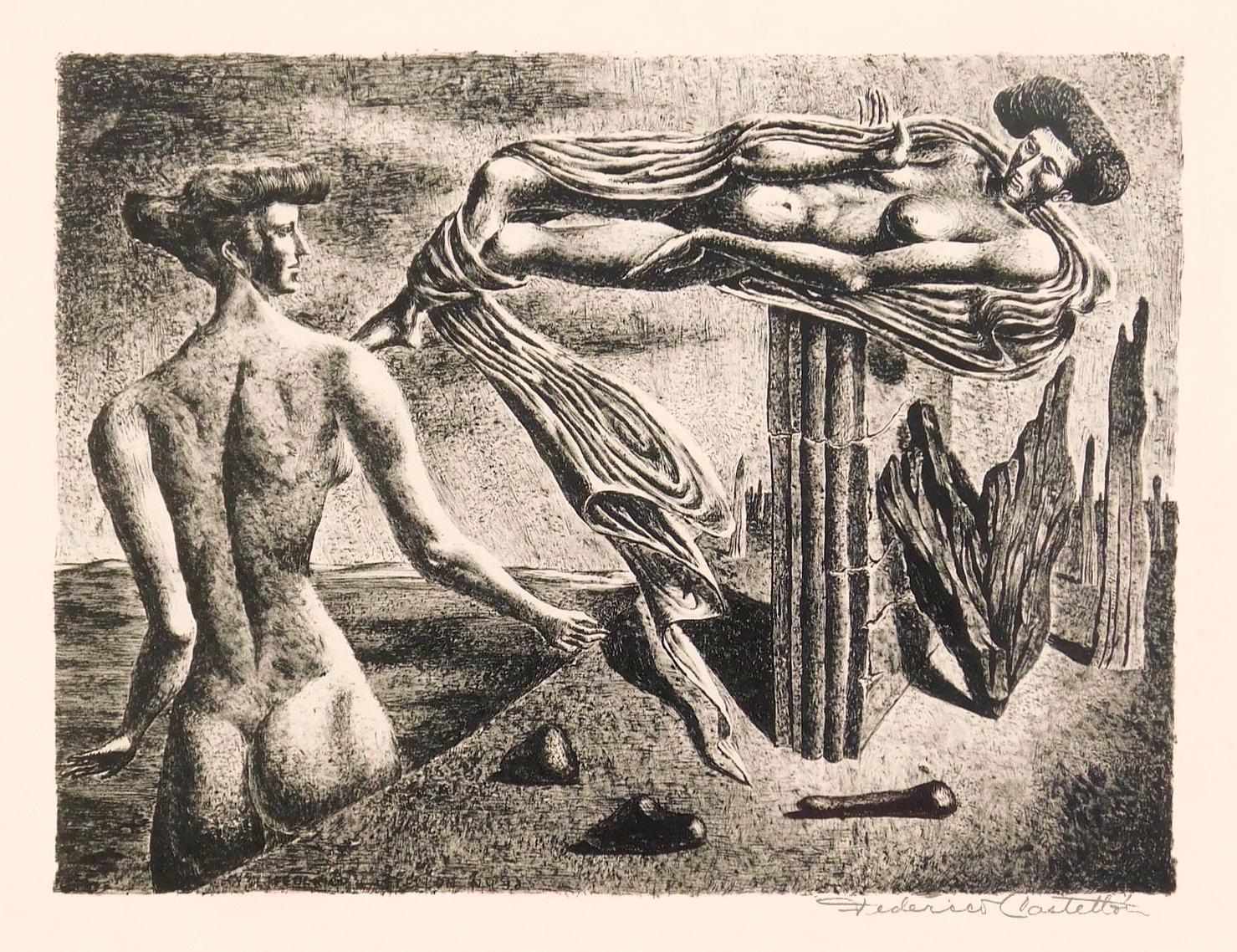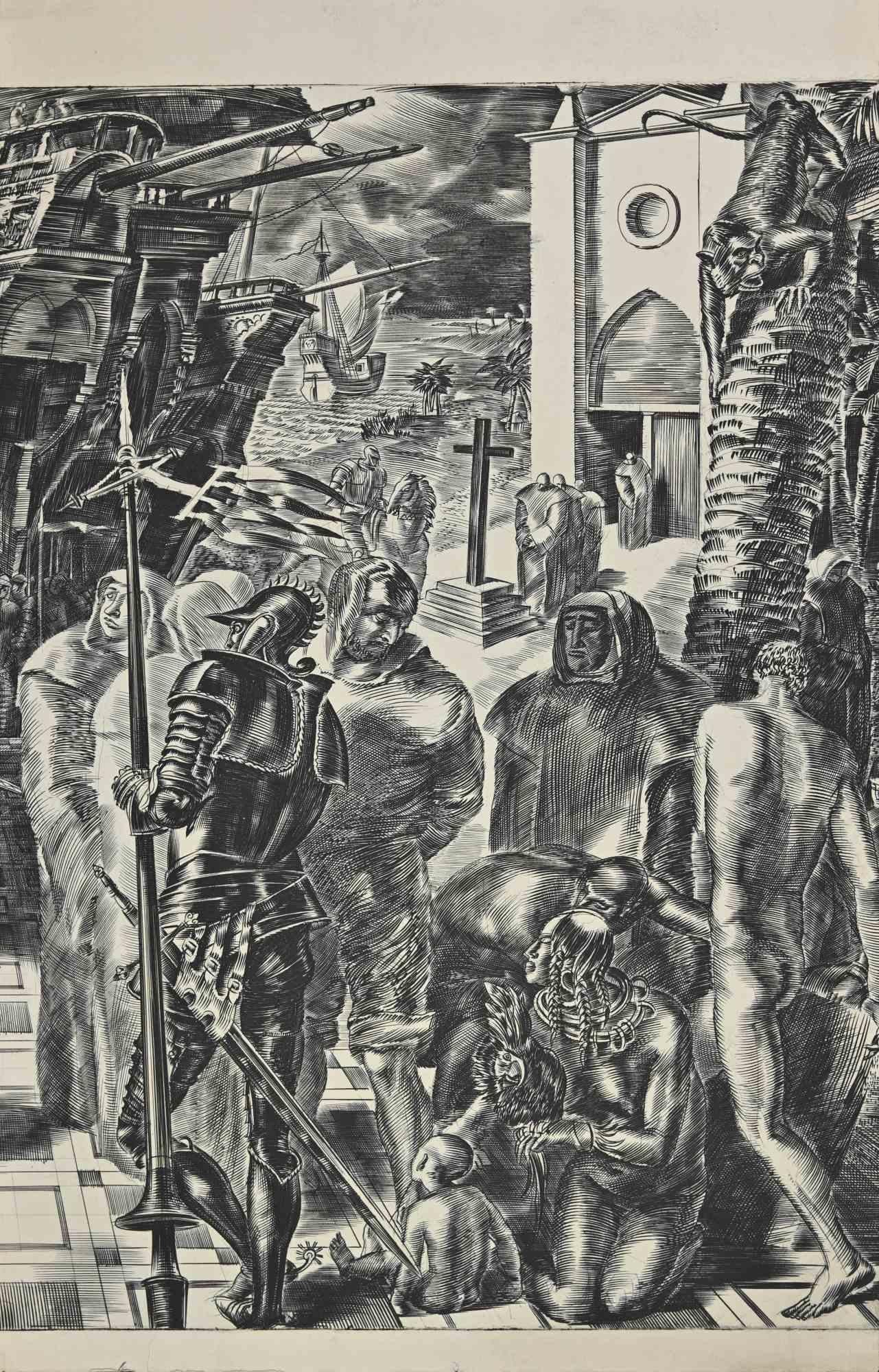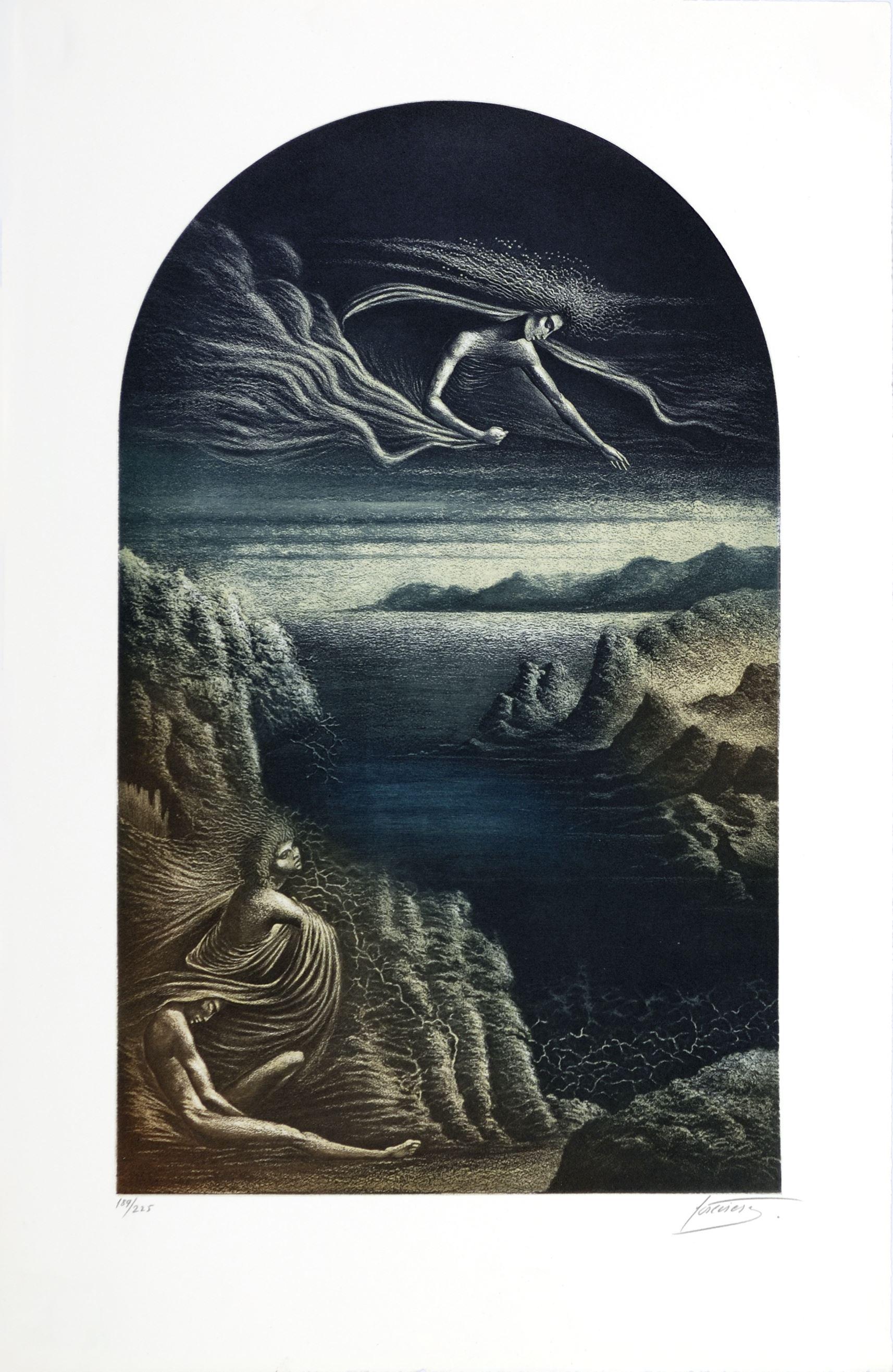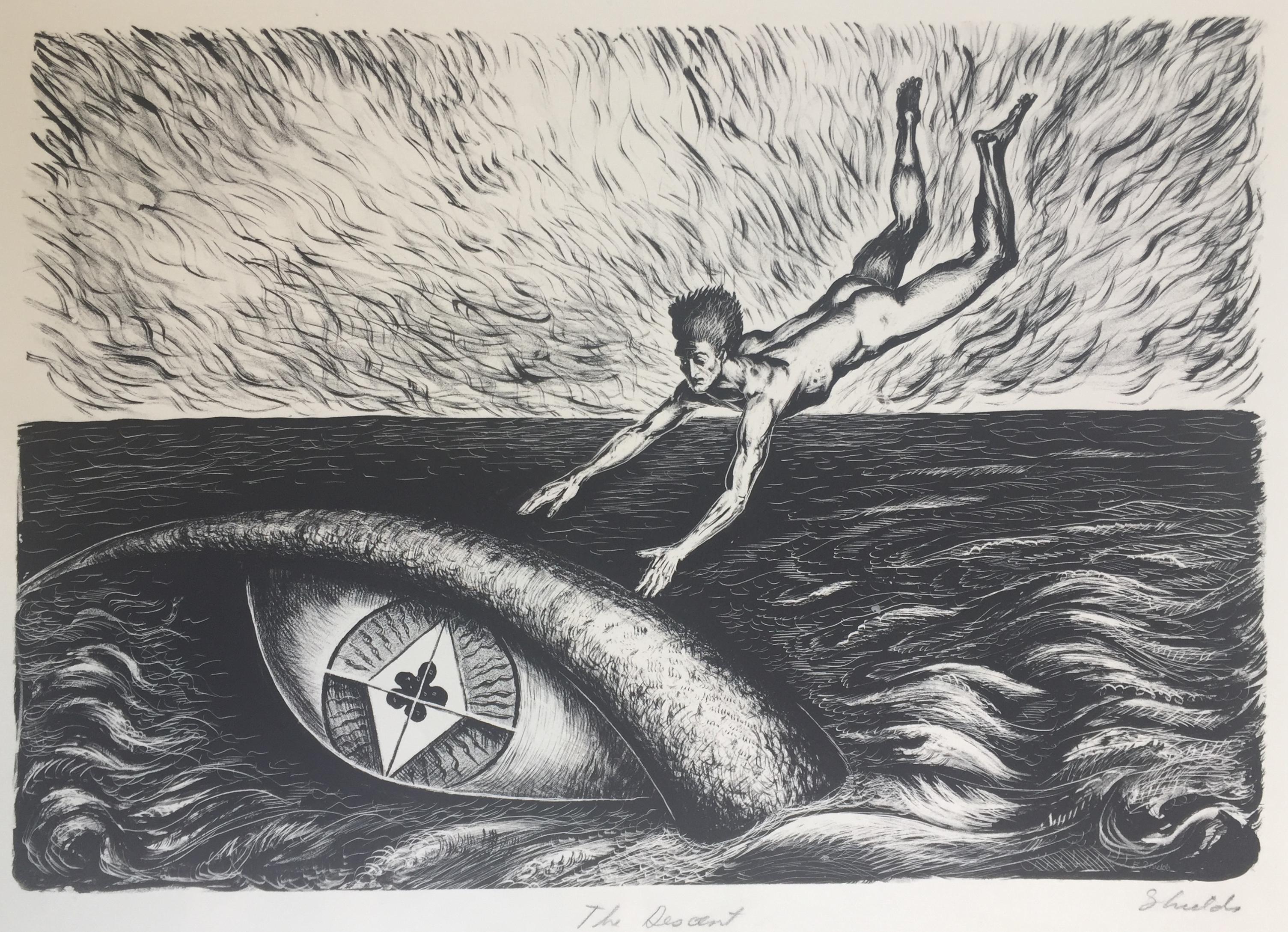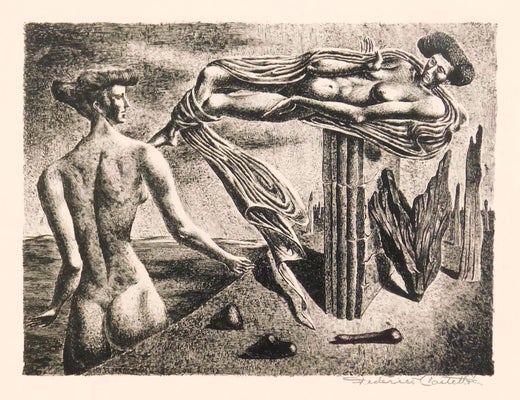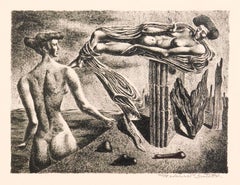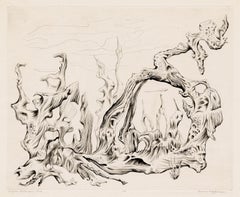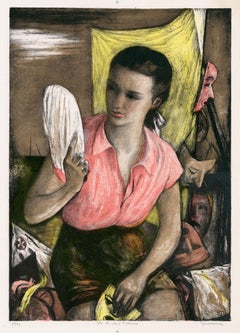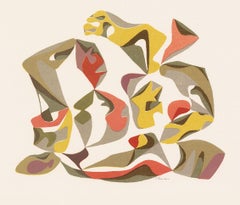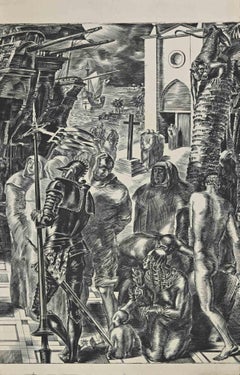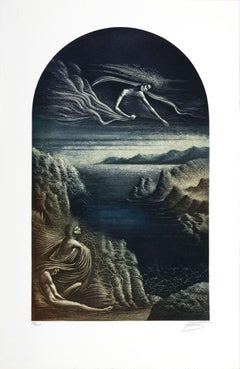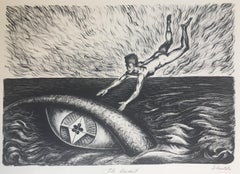Items Similar to 'By the Arks' — Mid-20th Century Surrealism
Want more images or videos?
Request additional images or videos from the seller
1 of 3
Federico Castellon'By the Arks' — Mid-20th Century Surrealism1941
1941
$750
£573.42
€656.99
CA$1,057.88
A$1,151.76
CHF 615
MX$13,903.57
NOK 7,731.70
SEK 7,191.38
DKK 4,907.40
About the Item
Federico Castellon, 'By the Arks', 1941, lithograph, edition 250, Freundlich 10D. Signed in pencil. Signed in the stone, lower left. A fine, atmospheric impression on cream, wove paper, with full margins (7/8 to 2 1/8 inches), in excellent condition. Matted to museum standards, unframed.
Image size 9 x 12 inches (229 x 305 mm); sheet size 11 7/8 x 16 inches
(302 x 406 mm).
In this haunting composition, Castellon recalls his childhood in Spain. Spanish boatbuilders repair beached boats and shelter from the sun under hanging fishnets. One shipwright extends his hand to a woman vendor who carries a basket on her hip while the other watches. The ship's figurehead seemingly offers protection from above.
Published by Associated American Artists, New York. Impressions of this work are in the permanent collections of the Pennsylvania Academy of the Fine Arts, Portland Art Museum, Smithsonian American Art Museum, Springfield Museum of Art, and the Washington County Museum of Fine Arts.
ABOUT THE ARTIST
“The art of Federico Castellon has a baffling yet fascinating quality. ...The artist sojourns in a world of free imagination, untrammeled by a logic of literal fact. He brings report of strange realms, uncharted seas of symbolism in the unconscious. The emblems and images which he brings back to us are clothed with the most minute and convincing verisimilitude and kind of superrealism."
—Carl Zigrosser, Federico Castellon, His Graphic Works, 1936-1971, August L. Freundlich, Syracuse University, New York, 1978.
Federico Castellon was only seven years old when his family immigrated from Almería, Spain, to Brooklyn, New York. He began sketching at an early age, as imaginative drawings provided an outlet for expression, which was particularly useful for Castellon, given his limited English at the time. Although his teachers recognized his talents as a draftsman, he remained largely self-taught. As a teenager, Castellon regularly visited museums in New York to study the Old Masters. After gaining mastery of realistic rendering, he became inspired by the work of the great modern artists, including Pablo Picasso, Georges Rouault, Diego Rivera, and Giorgio de Chirico.
Shortly after graduating from Erasmus High School, he completed an arts and sciences mural for the school. The mural, informed by his interest in European modernism, attracted critical attention and was exhibited in New York at Raymond and Raymond Galleries before being permanently installed in the school. At about this time, Castellon was introduced to Diego Rivera at a lecture the artist gave on his murals for Rockefeller Center. The older artist took an interest in the young man’s work and brought Castellon’s drawings to the attention of Carl Zigrosser, the Director of the Weyhe Gallery in New York, who gave the eighteen-year-old Castellon his first solo exhibition.
In 1934, with Rivera’s help, Castellon was awarded a four-year fellowship sponsored by the Spanish Government to study art and travel throughout Europe. During this time, he studied painting and printmaking, exhibiting his work at the Casa de Velázquez in Madrid and in the 1935 Paris Exhibition of Spanish and American Artists, which featured Pablo Picasso, Juan Gris, and Joan Miró.
In 1937, Castellon returned to New York and made his first lithograph with master lithographer George Miller. He exhibited in the Whitney Museum Annual in 1937 and 1938. In 1940, the Pennsylvania Academy of the Fine Arts awarded him the Eyre Medal for his lithograph Rendez-vous in a Landscape. He also exhibited at the Weyhe Gallery and the Art Institute of Chicago. In the same year, he received the first of two Guggenheim fellowships. In 1942, he participated in an exhibition at Carnegie Institute.
Although his formal education ended with high school, Castellon remained an avid reader with interests in psychology and philosophy. He became a United States citizen in 1943, and throughout the 1940s and 1950s, his work was informed by his travels abroad, including to China with the U.S. Army, Italy on his second Guggenheim fellowship, and Paris and Madrid, where he relocated his family for a brief period during the late 1950s. He also began teaching during this time, holding successive positions at Columbia University, Pratt Institute, the New School for Social Research, the National Academy of Design, and Queens College. He also took on commissions from American periodicals, most notably LIFE magazine.
In 1947, Castellon exhibited at the Philadelphia Art Alliance and again at the Carnegie Institute. In 1949, he was awarded a National Institute Arts and Letters Grant. He was elected to the National Academy and held solo exhibitions in Paris, Bombay, and New York at Associated American Artists.
Life magazine commissioned Castellon to create a series of paintings illustrating “Memorable Victories in the Fight of Justice” in 1951. He spent 1954 traveling with solo exhibitions of his paintings and graphics throughout South America. Life magazine published his work again in 1955, ‘56, and ‘57. From 1958 to 1960, he began working in sculpture, and from 1961 to 1963, he traveled with his family to France, Spain, and Italy. In 1963, he executed a series of lithographs at the renowned L’Atelier de Jacques Desjobert, Paris, and was elected to the National Academy of Design. Returning to the U.S. in 1964, Castellon held a solo exhibition at Terry Dintenfass Gallery in New York, exhibited at the New York World’s Fair, and received awards from the Philadelphia Print Club and the Society of American Graphic Artists. In 1966, he held a solo exhibition of graphic work at Associated American Artists, and in 1968, he was elected a Member of the National Institute of Arts and Letters. In 1971, the last year of his life, he exhibited at the Biennale Internationale de l'Estampe d'Épinal in Paris.
Castellón's prints and drawings from the 1930s represent some of the earliest examples of surrealism created in the United States. These highly original works predate his travels abroad and the Museum of Modern Art’s seminal exhibition, 'Fantastic Art, Dada, and Surrealism,' in July 1937.
Castellon's work is held in numerous museum collections in America and abroad, including the Amon Carter Museum of American Art, Art Institute of Chicago, Brooklyn Museum, The Butler Institute of American Art, Carnegie Museum of Art, Cleveland Museum of Art, Denver Art Museum, Instituto de Estudios Almerienses (Spain), The Isreal Museum (Jerusalem), Library of Congress, Los Angeles County Museum of Art, Museo Nacional Centro de Arte Reina Sofia (Spain), New Orleans Museum of Art, Pennsylvania Academy of the Fine Arts, Princeton University Art Museum, Metropolitan Museum of Art, Museum of Modern Art, Portland Art Museum, Saint Louis Art Museum, Smithsonian American Art Museum, Springfield Museum of Art, Washington County Museum of Fine Arts, and the Whitney Museum of American Art.
- Creator:Federico Castellon (1914-1971, American)
- Creation Year:1941
- Dimensions:Height: 9 in (22.86 cm)Width: 12 in (30.48 cm)
- Medium:
- Movement & Style:
- Period:
- Condition:
- Gallery Location:Myrtle Beach, SC
- Reference Number:Seller: 1032351stDibs: LU532315021182
Federico Castellon
Federico Castellón (1914-1971) was a Spanish-American artist known for his distinctive style that blended surrealism and realism. Born on the island of Almeria, Spain, he moved to the United States with his family at the age of seven. His artistic talent was evident from a young age, and he received a scholarship to study at the New York School of Fine and Applied Art when he was just 15. Castellón's work is characterized by a dreamlike quality, often incorporating elements of fantasy and a strong narrative sense. His early exposure to both Spanish and American cultures profoundly influenced his artistic vision, blending European surrealism with American realism to create a unique visual language. He was particularly renowned for his lithographs, etchings, and illustrations. His illustrations for Edgar Allan Poe's "The Masque of the Red Death" and other literary works are highly regarded for their intricate detail and haunting imagery. In addition to his printmaking and illustration work, Castellón was also a skilled painter and muralist. His paintings often featured surreal, dream-like scenes with a focus on human figures, and his murals are noted for their dynamic composition and rich symbolism. Throughout his career, Castellón received numerous awards and honors, and his work was exhibited widely in the United States and Europe. His legacy continues to influence artists and is recognized in the art world for its unique blend of surrealism and realism, along with a profound narrative quality that speaks to the human condition.
About the Seller
5.0
Recognized Seller
These prestigious sellers are industry leaders and represent the highest echelon for item quality and design.
Platinum Seller
Premium sellers with a 4.7+ rating and 24-hour response times
Established in 1995
1stDibs seller since 2016
334 sales on 1stDibs
Typical response time: 1 hour
Associations
International Fine Print Dealers Association
- ShippingRetrieving quote...Shipping from: Myrtle Beach, SC
- Return Policy
More From This Seller
View All'Body and Soul' — Mid-20th Century Surrealism
By Federico Castellon
Located in Myrtle Beach, SC
Federico Castellon, 'Body and Soul', 1938, lithograph, edition 30, Freundlich 3. Signed in pencil. Signed in the stone, lower left. A fine, richly-inked, atmospheric impression on cr...
Category
1940s Surrealist Figurative Prints
Materials
Lithograph
'European Landscape' —Mid-century American Surrealism
By Lawrence Kupferman
Located in Myrtle Beach, SC
Lawrence Kupferman, 'European Landscape', drypoint, edition 50, 1942. Signed, dated, titled, and numbered '7/50' in pencil. A superb, finely nuanced impression, on cream wove paper; the full sheet with margins (1 to 1 3/4 inches); in excellent condition.
Image size 10 7/8 x 13 3/8 inches; sheet size 13 1/8 x 16 1/2 inches. Archivally matted to museum standards, unframed.
An impression of this work is included in the permanent collection of the Syracuse University Art Museum.
ABOUT THE ARTIST
Lawrence Kupferman (1909 - 1982) was born in the Dorchester neighborhood of Boston and grew up in a working-class family. He attended the Boston Latin School and participated in the high school art program at the Museum of Fine Arts, Boston. In the late 1920s, he studied drawing under Philip Leslie Hale at the Museum School—an experience he called 'stultifying and repressive'. In 1932 he transferred to the Massachusetts College of Art, where he first met his wife, the artist Ruth Cobb. He returned briefly to the Museum School in 1946 to study with the influential expressionist German-American painter Karl Zerbe.
Kupferman held various jobs while pursuing his artistic career, including two years as a security guard at the Museum of Fine Arts, Boston. During the 1930s he worked as a drypoint etcher for the Federal Art Project, creating architectural drawings in a formally realistic style—these works are held in the collections of the Fogg Museum and the Smithsonian American Art Museum. In the 1940s he began incorporating more expressionistic forms into his paintings as he became progressively more concerned with abstraction. In 1946 he began spending summers in Provincetown, Massachusetts, where he met and was influenced by Mark Rothko, Hans Hofmann, Jackson Pollock, and other abstract painters. At about the same time he began exhibiting his work at the Boris Mirski Gallery in Boston.
In 1948, Kupferman was at the center of a controversy involving hundreds of Boston-area artists. In February of that year, the Boston Institute of Modern Art issued a manifesto titled 'Modern Art and the American Public' decrying 'the excesses of modern art,' and announced that it was changing its name to the Institute of Contemporary Art (ICA). The poorly conceived statement, intended to distinguish Boston's art scene from that of New York, was widely perceived as an attack on modernism. In protest, Boston artists such as Karl Zerbe, Jack Levine, and David Aronson formed the 'Modern Artists Group' and organized a mass meeting. On March 21, 300 artists, students, and other supporters met at the Old South Meeting House and demanded that the ICA retract its statement. Kupferman chaired the meeting and read this statement to the press:
“The recent manifesto of the Institute is a fatuous declaration which misinforms and misleads the public concerning the integrity and intention of the modern artist. By arrogating to itself the privilege of telling the artists what art should be, the Institute runs counter to the original purposes of this organization whose function was to encourage and to assimilate contemporary innovation.”
The other speakers were Karl Knaths...
Category
1940s Surrealist Abstract Prints
Materials
Drypoint
'I'll Be What I Choose' — Mid-century American Surrealism
By Benton Murdoch Spruance
Located in Myrtle Beach, SC
'I'll Be What I Choose: Vanity of Ambition', color lithograph, 1949, edition 40, Fine and Looney 281. Signed, titled, and numbered '23/40' in pencil. Initialed in the stone, lower ri...
Category
1940s American Modern Figurative Prints
Materials
Lithograph
$960 Sale Price
20% Off
'Salient in February' — Mid 20th-Century Surrealism
By Edward August Landon
Located in Myrtle Beach, SC
Edward Landon 'Salient in February', color serigraph, 1945, edition 40, Ryan 166. Signed in pencil. Titled, dated, and annotated 'ED. 40' in pencil. A fine impression, with fresh col...
Category
Mid-20th Century Surrealist Abstract Prints
Materials
Screen
'Le Paradis Terrestre' (Paradise on Earth) — French Symbolism
By Edouard Goerg
Located in Myrtle Beach, SC
Edouard Goerg, 'Le Paradis Terrestre' (Paradise on Earth), etching, 1931, edition 40. Signed, titled, and numbered '3/40' in pencil. A fine richly-inked impression, on heavy, cream w...
Category
1930s Symbolist Figurative Prints
Materials
Etching
'To Market, to Market' — Surrealist Fantasy
Located in Myrtle Beach, SC
Zena Kavin, 'To Market, to Market', lithograph, c. 1935, edition 20. Signed, titled, and numbered '6/20' in pencil. A fine, richly-inked impression, on cream wove paper, with full ma...
Category
1930s American Modern Figurative Prints
Materials
Lithograph
$360 Sale Price
20% Off
You May Also Like
Surrealist Scene
Located in San Francisco, CA
This artwork, Surrealist Scene c.1980 is an original color lithograph by Italian/Israeli artist Mario Doretti, born 1929. It is Hand signed and numbered 43/200 in pencil by the artis...
Category
Late 20th Century Surrealist Figurative Prints
Materials
Lithograph
The Departure from The Port - Etching - Early 20th Century
Located in Roma, IT
The Departure from The Port is an original etching realized by an Anonymous artist in the Early 20th Century.
In good conditions with some folding and ...
Category
Early 20th Century Modern Figurative Prints
Materials
Etching
Jose Viera Spanish Artist Original Hand Signed engraving surrealism n1
Located in Miami, FL
José Viera (Spain, 1949)
'La noche', ca. 1990-1999
engraving on paper
15.8 x 24.5 in. (40 x 62 cm.)
Edition of 225
ID: VIE1176-001-225
Hand-signed by author
Category
20th Century Contemporary Prints and Multiples
Materials
Paper, Engraving, Screen
The Decent (Published by the WPA/Federal Arts Project)
Located in Santa Monica, CA
FRANCIS SHIELDS (1908 – 1984)
THE DESCENT c. 1937
Lithograph, signed and titled. Edition c. 25. Done for the WPA/Federal Art Pro...
Category
1930s Surrealist Landscape Prints
Materials
Lithograph
Jose Viera Uruguayan Artist Original Hand Signed engraving surrealism n1
Located in Miami, FL
José Viera (Uruguay, 1949)
'La noche', N/A
engraving on paper
15.8 x 24.5 in. (40 x 62 cm.)
Edition of 225
ID: VIE1176-001-225
Hand-signed by author
Category
20th Century Contemporary Prints and Multiples
Materials
Paper, Engraving, Screen
Untitled - III, Surrealist Lithograph by Wojtek Kowalczyk
Located in Long Island City, NY
Untitled - III
Wojtek Kowalczyk, Polish (1960)
Date: 2005
Lithograph, signed in pencil
Size: 19.5 in. x 13.5 in. (49.53 cm x 34.29 cm)
Category
Early 2000s Surrealist Landscape Prints
Materials
Lithograph
More Ways To Browse
Spanish Library
Vintage Fishnet
Woman Carrying Basket
Dali Bird
Dali Don Quixote
Dali Dragon
Dali Le Cavalier
Dali Lithograph Bullfighter
Dali Signed Lithograph Numbered
Dali Virgil
Damien Hirst Gold
David Hockney Diver
David Hockney Munich
David Hockney Signed Poster
Divan Hafez
Double Elvis
Durer Original
Dylan Glaser
